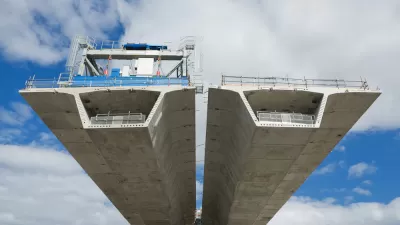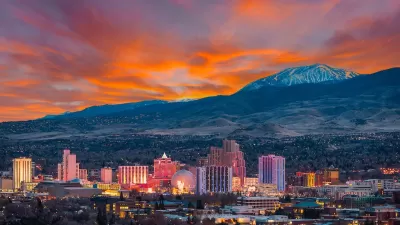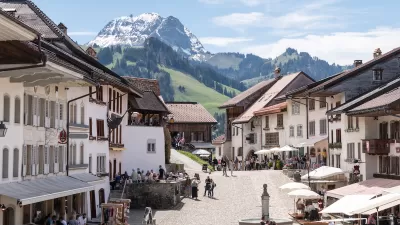Two economists discuss how specific kinds of deregulation could speed up growth. They emphasize planning issues: local overregulation of development and the high cost of infrastructure, among others.

In this piece, the follow-up to a debate on how government can promote growth, economists Tyler Cowen and Noah Smith debate how the American economy can be made more efficient and productive. They advocate for looser regulations and labor laws, but they also touch on land use policy and infrastructure.
Says Smith, "I think the two biggest and most obvious things to address are land-use regulation and occupational licensing. There's an increasing recognition that policies to prevent dense development are holding cities back from their economic potential."
Smith also favors infrastructure investment. "Repairing our existing infrastructure gets the highest returns, of course. But increased investments in new things like self-driving car infrastructure, smart electrical grids and faster broadband seem like they could also pay dividends."
Cowen pushes even harder for deregulation. "We couldn't have built today's energy infrastructure with today's regulations, so how are we to manage the energy infrastructure of the future? Less NIMBYism for wind power is step one of a thousand we could make. Or take fracking. It has made energy cheaper, created jobs and helped lower carbon emissions. And yet it remains a legally fraught enterprise."
Smith agrees that we have made it very difficult to build new infrastructure, but doesn't assign blame to labor laws, as Cowen does. "Regarding infrastructure costs, I doubt that unionized labor is a big part of our problem, since Europe has stronger unions but much cheaper costs. It's probably due more to our inefficient contracting process."
FULL STORY: Debating the Supply Side of Growth

Planetizen Federal Action Tracker
A weekly monitor of how Trump’s orders and actions are impacting planners and planning in America.

The Simple Legislative Tool Transforming Vacant Downtowns
In California, Michigan and Georgia, an easy win is bringing dollars — and delight — back to city centers.

San Francisco's School District Spent $105M To Build Affordable Housing for Teachers — And That's Just the Beginning
SFUSD joins a growing list of school districts using their land holdings to address housing affordability challenges faced by their own employees.

In More Metros Than You’d Think, Suburbs are Now More Expensive Than the City
If you're moving to the burbs to save on square footage, data shows you should think again.

The States Losing Rural Delivery Rooms at an Alarming Pace
In some states, as few as 9% of rural hospitals still deliver babies. As a result, rising pre-term births, no adequate pre-term care and "harrowing" close calls are a growing reality.

The Small South Asian Republic Going all in on EVs
Thanks to one simple policy change less than five years ago, 65% of new cars in this Himalayan country are now electric.
Urban Design for Planners 1: Software Tools
This six-course series explores essential urban design concepts using open source software and equips planners with the tools they need to participate fully in the urban design process.
Planning for Universal Design
Learn the tools for implementing Universal Design in planning regulations.
Smith Gee Studio
City of Charlotte
City of Camden Redevelopment Agency
City of Astoria
Transportation Research & Education Center (TREC) at Portland State University
US High Speed Rail Association
City of Camden Redevelopment Agency
Municipality of Princeton (NJ)





























